A Conversation with Distinguished Researcher Naohide Oue
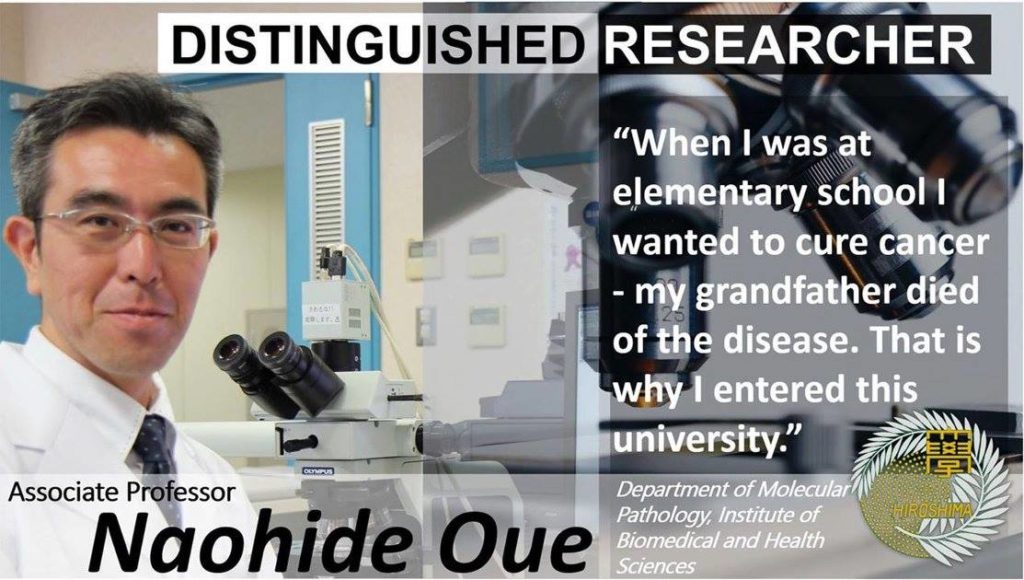
Can you tell me your name and specialist field?
My name is Naohide Oue. I specialize in the molecular pathology of gastrointestinal cancer. While my focus is on stomach cancer, I also analyze esophagus and colon cancers.
What are you working on right now?
My main research project is the identification of specific markers for diagnosing cancer. For example, different types of cancer cells secrete unique proteins. We hope to discover the type of protein secreted by each type of cancer cell – we can then develop ways to detect the protein, and thus the cancer. 10 years ago, I discovered the transmembrane protein expressed by human stomach-cancer cells; the search continues for more of these markers.
How would these markers be utilized?
Early diagnosis of stomach cancer is very important – but many people do not go to hospital for a checkup until it’s too late. The proteins secreted by stomach cancer cells enter the blood and if we can find a way to detect them, we can then develop simple blood tests that can be used periodically– perhaps in the home. It’s about saving lives.
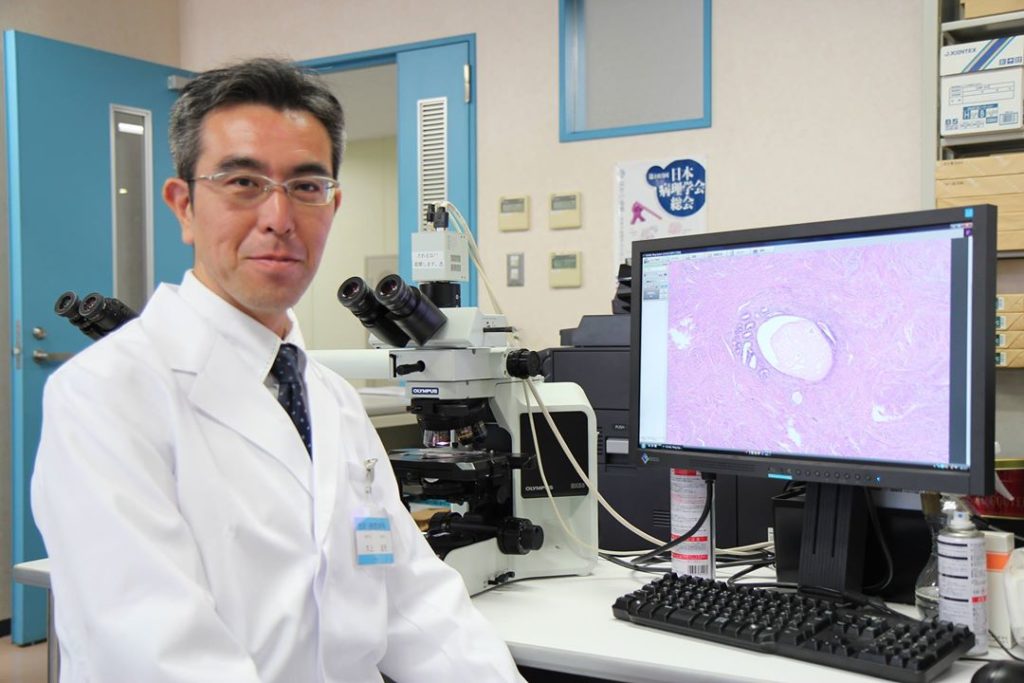
What are you most proud of in your career?
About 13 years ago I performed a SAGE analysis of human stomach cells, (SAGE: a technique for providing a snapshot of genes present in a given sample) and two of the genes I found are important for growing cancer stem cells. Many researchers read this paper and were able to analyze these two important genes.
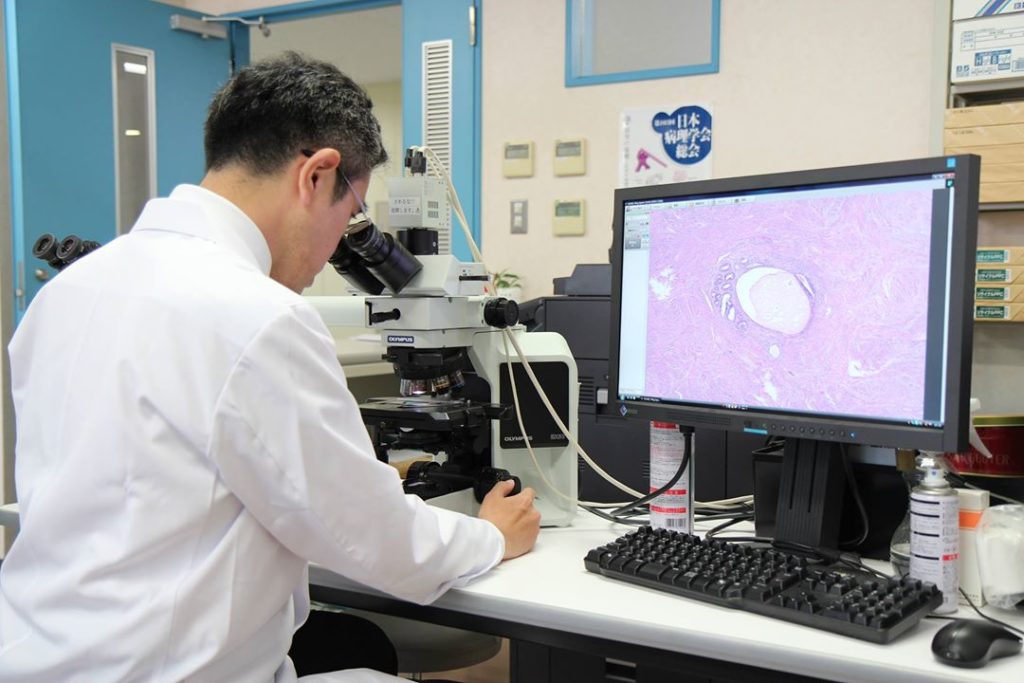
Is stomach cancer becoming more or less prevalent?
In Japan, incidences are gradually decreasing now but it is still the most common type of cancer in this country. It is so common here because of the diet. This part of the world, Japan, China, Korea – we eat a lot of food containing salt. Salt is one of the main causes of gastric cancer.
What is the biggest disappointment in your career?
There are many researchers in this field, but some have more funding than others. Some at the bigger universities can carry out whole genome sequencing, where they search for genes very easily, and rapidly, using state of the art technology; their results are published in the top journals and they are lauded. This type of study doesn’t require much thinking but the rewards are immense.
Why is your research important to you?
When I was at elementary school I wanted to cure cancer as my grandfather died of the disease. That is why I entered this university. He died of lung cancer, but as stomach cancer is such a big issue in Japan I ended up researching it.
Can you tell me a little more about your background?
I was born in Hiroshima city and I have lived here my whole life. I entered the medical school here to become a doctor, but as I wanted to work on curing cancer from an early age, I followed a path into research.
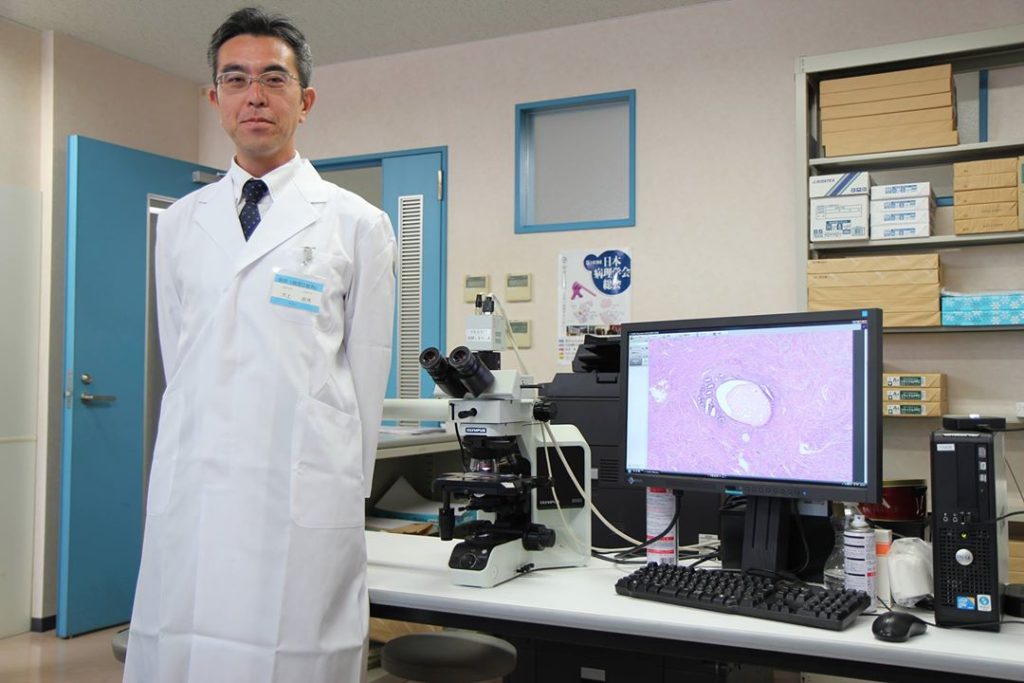
What is your work life like?
The conditions are very good. I graduated from the University in 1999 and entered this department– so I have worked 18 years in this building! When I first entered the university, we were based at the Higashi-Hiroshima campus, which was still under construction then.
So in terms of a daily basis, do you work long hours?
Previously I did. I am 43 now (in 2017) but until I was in my late 30s, I slept in this room and only went home one or two times a week! I like research, and all I was thinking about those days was research. I have two children now and I'm over 40 years old so I get tired easily! I can't do it anymore.
Outside of work, what do you do in your downtime? Do you have a hobby?
I am interested in old Japanese porcelain and ceramics [hands photography book on subject to SCF]. These are about 400 years old. I like to go to the museums in Hiroshima or Kure. This [porcelain turtle on desk] is 300 years old.
Have you ever studied abroad?
Yes, I went to The National Institute of Health in Washington, USA. I analyzed cancer in the lab there for six months. I enjoyed it but I don't think I'll get a chance for work overseas again.
Do you recommend that students and faculty spend time in another country?
Of course, I recommend they study abroad. Many Japanese researchers cannot speak fluent English– like me. So they should go abroad and learn English conversation– and also make connections. In the USA the laboratory culture is quite different from Japan so I think it would help to see these alternative working styles.
“I never imagined 10 years ago that whole genome sequencing would take only two days to complete – so I can't even guess what will be possible by 2027”
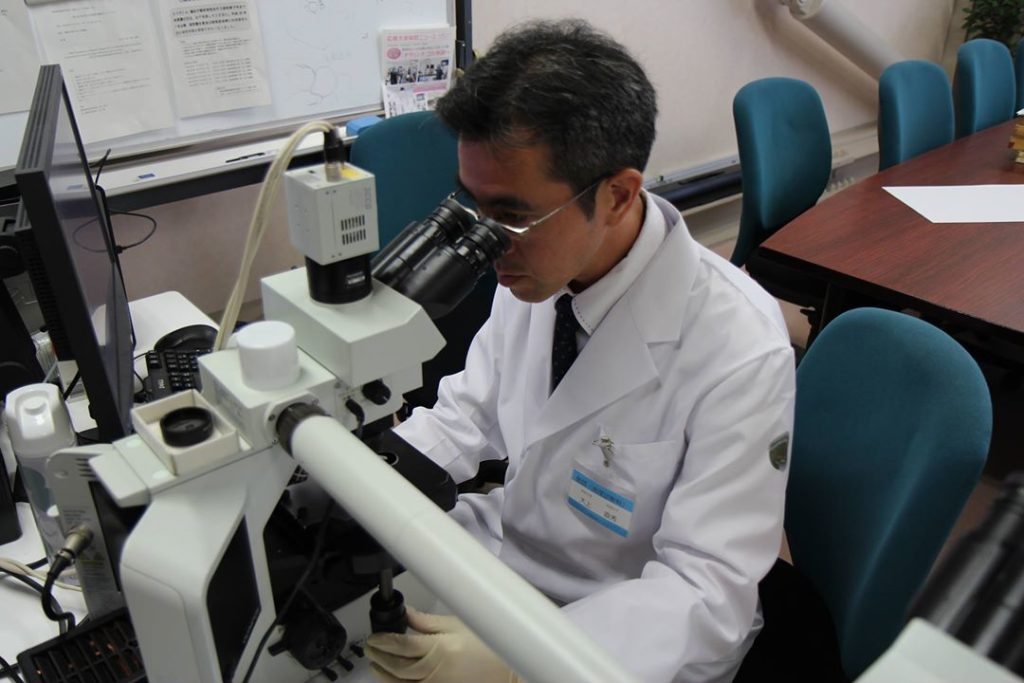
Are you optimistic about the future?
Because so many famous researchers with access to funding are carrying out whole genome mapping now we have to work harder to compete. But, as pathologists we have an advantage over many other researchers – we can observe the microscopic structure of cancer tissues using microscopes. It is a skill that many in our field are lacking – and many don’t really understand how it works. This is where we can still excel.
Where do you see yourself in 10 years' time?
You know I never imagined 10 years ago that whole genome sequencing would take only two days to complete – so I can't even guess what will be possible by 2027. Histochemical (the branch of science that deals with the chemical composition of the cells tissues of the body) examination will likely still be important so I will be doing that and continuing my cancer research
If you had not become a scientist, what would you have been? A historian?
History?! No I don't think so. I probably would have become a physician… Actually, I would like to have entered Tokyo or Kyoto University and studied electrical engineering.
What is the best thing about working at HU?
Hiroshima prefecture has many cancer patients so we can easily obtain specimens and analyze patients.That's a bit morbid but there were many atomic bomb survivors and we can analyze the association between the bomb and cancer.It happened about 70 years ago so there are fewer every year.
What are your views on collaboration?
It's a necessity. We are pathologists, so our advantage is histology examination (microscopic study of tissue samples) but many researchers can't understand it at all. So we can perform histological examination, as well as whole genome sequencing – or even help develop nanomedicines. We have many advantages that require others to seek our collaboration. Even the National Cancer Center of Japan has lots of data on whole genome sequencing, or nanotechnology for cancer therapy but they still can't carry out cancer histology.
What is the best thing about your job?
Recently I was appointed a Hiroshima University Distinguished Researcher. I'm happy about that.
Finally, will there ever be a cure for cancer?
It's difficult. Cancer therapy is not easy, so early diagnosis is key; we should continue to focus on developing early diagnosis methods. In future I envisage a cancer self-check blood test as being as normal as brushing your teeth – part of the daily routine.
Read more articles on Distinguished Professors / Researchers here
Written by Richard J. O'Connor (Hiroshima University Science Communication Fellow)
Find out more about Associate Professor Naohide Oue and how to contact him here: http://seeds.office.hiroshima-u.ac.jp/profile/en.85a053b87f7c2126520e17560c007669.html

 Home
Home